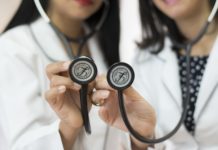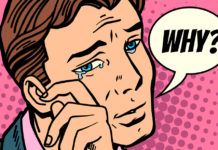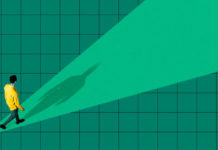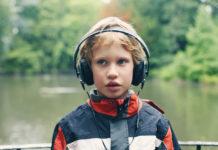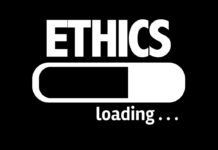No, Jill Biden Should Not Be Called “Doctor”… But Only Because No One Should
Jill deserves all the defense she is receiving. However, this rush to defend Jill’s honorific usage is missing a much bigger and far more pervasive point: NO ONE should be called “Dr. Last-name.”
Narrow Escape: My Prescribed Nightmare
It has taken me close to three years to be able to live with my memories from the hospital, where I felt completely and utterly alone, despairing that I might never live a normal life or see my family again.
Listening to the Patient Voice: The Antidepressant Withdrawal Experience
Patient advocates join with researchers and service users to present first-hand experiences of antidepressant withdrawal.
Insane Medicine, Chapter 5: The Manufacture of Childhood Depression (Part 2)
The promotion of SSRI antidepressant use began with the pharmaceutical industry and occurs despite evidence that these drugs are harmful, not helpful, in children and adolescents.
Literally Indescribable: Are Antidepressants Addictive?
“My life was very, very good.” That’s how Michael sums up how things were for him—prior to his suffering from devastating withdrawal effects after discontinuing GlaxoSmithKline’s blockbuster drug Paxil.
Psychiatric Medication: Does It Work?
One can lead a good life with a “mental illness” and I am the case. Yes, it is possible. Even with a diagnosis of “bipolar” above your head.
Letters to My Doctors (Part 2)
Why am I whole when I dance and paint but deathly ill when faced by a European/American medical mechanic? Why was I locked in a room for a week in the first place? Was it to heal? Or was it to fill a bed?
Finding Meaning in Suffering: How Existentialism Can Help
Suffering is a universal human condition. But without making meaning of suffering, it can overwhelm us. Finding meaning in suffering might help to find the will to survive when life is difficult.
Surviving the Bipolar Label
The label bipolar validated that I was suffering, yes, but it was also a bargain that asked me to see my suffering as unreasonable, the result of a deformity within my body.
Insane Medicine, Chapter 5: The Manufacture of Childhood Depression (Part 1)
The medicalisation of our emotional lives has led to a horrific cultural shift in which we, and our children, have become alienated from and suspicious of our emotions, chipping away at our natural resilience.
No, Autism Is Not Over-Diagnosed
Autism is an umbrella diagnosis at this point. The broadness of the diagnosis doesn’t tend to be useful to clinicians. But it is very useful to the individuals who live with it.
Exploring Psychiatric Drug Withdrawal: A Town Hall Discussion Series
Our new discussion series aims to explore what we do and don’t know about safe withdrawal from antidepressants, antipsychotics, benzodiazepines and stimulants.
Letters to My Doctors (Part 1)
I struggle as to how to talk to you guys, and there can be no progress without communication. Today, I am attempting to begin a bridge so that you will not be afraid of me and I will not be afraid of you.
The Ups and Downs of Online Therapy
Now that the novelty has worn off and we are able to step back and analyze the situation, what does the switch to teletherapy portend for our profession?
New FDA Study Shows Benzodiazepines Can Cause Long-Term Injury
The FDA has finally acknowledged the adverse effects of benzodiazepines, the dangers of withdrawal, and that the current packaging does not sufficiently warn of these harms.
I Live
Why is it such a “crime” to explore alternative realities, and look for something beyond our totally medicalized society? In some cultures, one would be revered instead, and not locked away.
Insane Medicine, Chapter 4: The Manufacture of Autism Spectrum Disorders (ASD) (Part 2)
No one has come near to finding a genetic basis or a characteristic neurological abnormality for autism, and as a result there is no biological marker or brain scan used to diagnose ASD.
Suicide Rates Did Not Decrease When Antidepressant Drugs Were Introduced
Researchers investigate the claim that the introduction of antidepressant drugs led to decreases in suicide rates internationally.
Social Adversity, Mental Distress, and the Theatre of the Oppressed
The theatre of the oppressed directly challenges societal problems of oppression. Here the involved learn much from the enactment—concrete possible solutions and possible practices of resistance.
Dual Diagnosis Anonymous: Peer Support for Those Who Need It
What worked for participants is the compassionate, welcoming, inclusive and non-judgmental approach of DDA. It is about peer support, role modelling, hope, building skills… acquiring self-confidence and building a new identity.
Writing Is My Best Medicine
For me, writing is a powerful tool for wellness and healing, whether that involves an escape into science fiction or simply putting my dreams, emotions, memories, and observations on paper.
Insane Medicine, Chapter 4: The Manufacture of Autism Spectrum Disorders (Part 1)
Because the “scientists” who study, categorise, and establish guidelines for autism can’t find anything definitive, they resort to scientism. Over time, it becomes part of our cultural “common sense.”
Does the NASW Code of Ethics Prohibit Peer Work?
An analysis of the National Association of Social Workers Code of Ethics’ regulations on dual relationships: Indications for self-disclosure and problematic consequences for peers entering the social work workforce.
The Mad Priestess: A Call to Healing
A mad priestess kicks shame and stigma in the teeth, knowing that we can do better. We could be leading the charge for healing—please don’t call it “mental illness” anymore—and take our place as the wounded healers.
Stop Saying This, Part 6: It Takes Two, Life’s Not Fair, and More
It’s common that both people are contributing to the issue in one way or another. However, there is at least one instance that renders “it takes two” unavailable for blanket-statement use, and that is abuse.



